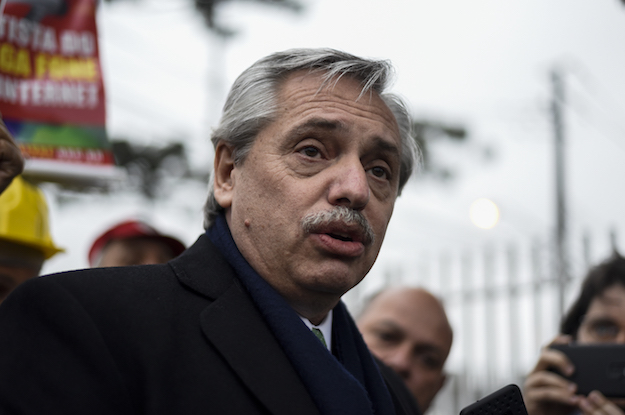Click here to read more about Argentina’s presidential race.
“When I don’t agree with something, I say no.”
In his first official campaign ad, Argentine presidential hopeful Alberto Fernández sent a subtle message to voters: Former President Cristina Fernández de Kirchner may be my running mate, but I’m not her puppet.
“Cristina thinks I’m a peacemaker, and it’s true,” Fernández said in the ad, which premiered online on July 6 and on television the next day. “But when it’s necessary, I know how to put things in order.”
Like a second video that followed, the ad only briefly referenced Fernández’s high-profile running mate, underscoring the delicate balance he’ll have to strike between unifying a fractured Peronist movement and creating enough distance from Kirchner to win over skeptical voters outside her base.
Fernández, who served under both Kirchner and her late husband, former President Néstor Kirchner, as cabinet chief, will need support from the large following she continues to command as a senator. But that won’t be enough. Fernández also needs to draw in support from Peronists who grew disillusioned with Kirchner during her presidency.
“You begin to notice a huge messaging problem: In order to win votes, Fernández has to criticize his running mate, who is precisely the one who has the votes,” political analyst Carlos Pagni wrote in La Nación on July 9.
Somehow, Fernández has been doing just that – but carefully and in ways that are also allowing him to rebuild perceptions of his loyalty to Kirchner.
In recent interviews, Fernández has stood by criticisms he made of Kirchner’s policies after leaving her administration in 2008. That includes her government’s deception over worsening poverty figures (“I never agreed with those things and I still don’t”), its 2013 memorandum of understanding with Iran (“I said and say that it was a gross error of Cristina’s government”), and her battle with the media (“I was on the side of the journalists”).
“(Fernández) has a credible background because for around 10 years he was vocally critical of Cristina,” Sergio Berensztein, a pollster and political analyst, told AQ.
Fernández has also injected an element of moderation into his defense of Kirchner as she stands trial for corruption charges, saying that one case may have involved “ethical oversight,” before adding, “that’s one thing, and a crime is something else.”
It has helped Fernández that as the campaign period for obligatory primaries began on July 7, Kirchner was in Cuba, where her daughter is undergoing medical treatment. Fernández instead campaigned in the electorally vital province of Buenos Aires alongside Sergio Massa and Axel Kicilof, both candidates for Fernández and Kirchner’s coalition and each representing a faction of Peronism that Fernández hopes to unite. The trip was an opportunity for Fernández, who hasn’t held office in over a decade, to become the protagonist of a candidacy announced – and, for many, defined – by the polarizing former president.
“This is the time for him to establish his own leadership,” Berensztein told AQ. “(Kirchner) is on the sidelines, and this is a way to try to seduce the independent voters in the middle who have consistently voted against her for a long time.”
Berensztein said it’s too early to tell if this strategy will work, and things could change after Kirchner’s return to Argentina on July 10. Polls, meanwhile, are also limited in what they reveal. Most surveys conducted in late June and early July found that while the Fernández ticket would receive the most votes in a first round, a runoff election against President Mauricio Macri would still be close. In one July poll from Opinaia, Fernández’s support remained unchanged since May, at 32% in a first round. But 14% of respondents said they were unsure of who they would support, suggesting there may still be voters in the middle Fernández can win over.
Whether he ultimately succeeds in that effort may come down to how clearly he can distance himself from his running mate’s controversial past – and present. But Fernández has sent signals that he will only go so far.
“You’re not going to make me fight with her,” Fernández told La Nación. “I am never going to break with Cristina.”
—
O’Boyle is a senior editor for AQ. Follow him on Twitter @BrenOBoyle








